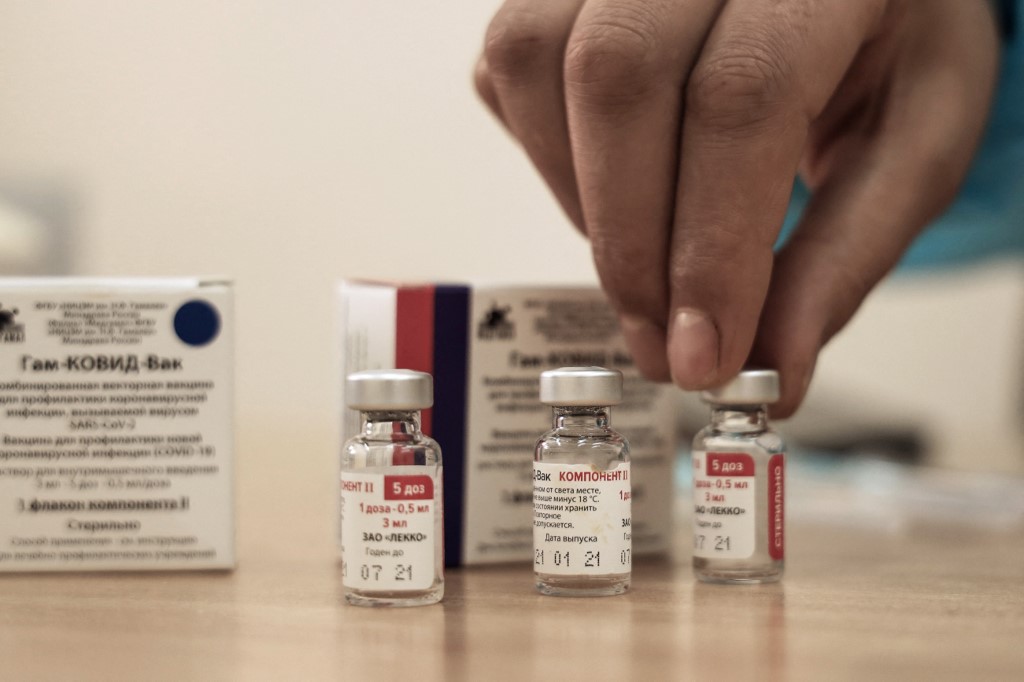KUALA LUMPUR, March 26 — Malaysia may lose 6.4 million pre-ordered doses of Russia’s Covid-19 vaccine to another country if local regulators do not approve it quickly, Khairy Jamaluddin said.
When asked if Malaysia would order another 6.4 million doses of Sputnik V, the vaccine minister said the government’s immediate concern was to ensure that a meeting in the first week of April by the Drug Control Authority (DCA), under the National Pharmaceutical Regulatory Agency (NPRA), approve the Russian coronavirus shot first.
“We want to secure the first 6.4 million, which if we don’t sign the agreement and get the regulatory approval soon, may go to another country because more countries have been approving the Sputnik V vaccine,” Khairy told CodeBlue in an exclusive interview Wednesday.
“We’ve had this on hold due to our negotiations with the Russians, with RDIF (Russian Direct Investment Fund), but if we really don’t get through the regulatory threshold soon, we might lose that 6.4 million. So I think it’s a bit premature to talk about the additional 6.4 million. I want to secure the existing order first.”
A peer-reviewed interim analysis of Sputnik V’s Phase Three clinical trial, published in medical journal The Lancet last February 2, showed that the Russian vaccine was 91.6 per cent effective against Covid-19 and fully protected against severe Covid-19 disease.
The European Medicines Agency (EMA) is currently evaluating the Russian jab, even as some European Union countries in eastern Europe have reportedly already ordered or used it. The Guardian reported that Germany’s regulatory authority has publicly praised Sputnik V and Italy could be the first European country to produce the Covid-19 vaccine from July.
Khairy said if NPRA approved the Russian vaccine in the first week of April, Malaysia may start receiving doses by May, as the vaccine developer has indicated that delivery can begin a month after regulatory approval and the signing of the purchase agreement. Malaysia can expect delivery of five million doses of Sputnik V, a two-dose vaccine, in the second quarter of the year.
The science, technology, and innovation minister added that local pharmaceutical company Duopharma Berhad has decided not to undertake fill-and-finish of the Russian vaccine, but to bring in the finished product if it is approved.
Instead, the Sputnik V vaccine developer, Gamaleya Research Institute of Epidemiology and Microbiology, will sign a research and development (R&D) partnership with the National Institutes of Biotechnology Malaysia and subsequently with Duopharma for future manufacturing.
As for China’s Sinovac Biotech vaccine, Khairy said the expert working group at the Special Committee on Ensuring Access to Covid-19 Vaccine Supply (JKJAV) has requested for additional clinical trial data from Turkey and Chile before deciding whether or not to recommend against the use of CoronaVac for people aged 60 and above.
“But in Turkey and Chile, as well as in Indonesia, Sinovac is administered to people above 60 as well.”
Malaysia’s NPRA has given conditional approval to the Sinovac vaccine, despite the lack of published Phase Three clinical trial results in a peer-reviewed journal. The Ministry of Health’s (MOH) pharmacy regulatory division told CodeBlue recently that a late-stage study among health care workers in Brazil showed CoronaVac was 50.65 per cent effective in preventing symptomatic Covid-19, just clearing the World Health Organization’s (WHO) minimum 50 per cent efficacy standard.
A study in Turkey reportedly downgraded the Sinovac vaccine’s efficacy to 83.5 per cent, based on final results of Phase Three trials, from an initial finding of 91.25 per cent.
Khairy said NPRA has yet to approve local pharmaceutical company Pharmaniaga Berhad’s fill-and-finish facility for human vaccines. Pharmaniaga, which was appointed to undertake the final manufacturing of the Sinovac vaccine, will submit stability testing results to NPRA in the middle of April after starting in March, as at least one month’s worth of stability testing is needed.
Stability testing checks the quality of a pharmaceutical product over a certain period and under the influence of environmental factors like temperature, humidity, and light, so as to examine attributes susceptible to change during storage that could influence safety and efficacy.
“We hope to get approval from NPRA in the middle of April for Pharmaniaga,” Khairy said.
The vaccine minister also explained that Pharmaniaga can produce finished doses of Sinovac’s vaccine next month itself. Pharmaniaga is expected to deliver five million doses in the second quarter of the year. Besides the bulk product of more than 300,000 Sinovac doses, Malaysia has also received 200,000 finished doses of the Chinese vaccine.
“Sinovac has already processed the 300,000 vials that came in from the bulk product the other day. While doing the stability testing, they actually put all the bulk liquid into vials, so there’s already 300,000 doses ready to be utilised.
“And they’ve brought in more bulk while waiting for regulatory approval and started manufacturing the fill-and-finish, so I think they’ve gotten off their head start already.”
When asked if he or anyone else pressured NPRA to approve the Sinovac vaccine, Khairy said both he and Health Minister Dr Adham Baba “have never instructed NPRA to approve anything”.
“What we’ve done is we’ve facilitated information from the pharmaceutical companies to NPRA, but in terms of setting them a firm timeline or deadline, or even forcing them to approve any vaccines, I don’t think that’s ethical. And that’s not proper,” Khairy said.
“I’ve maintained a respectful professional distance with NPRA because they’re a regulatory agency,” he added. “As far as I’m concerned, the independence of NPRA, the independence of the Drug Control Authority that approves drugs that are brought into Malaysia has been preserved throughout the whole process of the national immunisation programme.”








